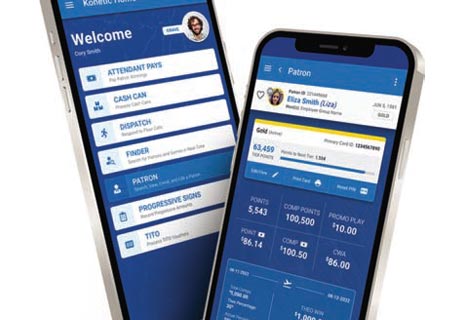Sizing Up Casino Management Systems

The gaming industry has never been bigger, richer or more sophisticated. In 2023, U.S. commercial casinos won $65.5 billion—their best year ever—and worldwide revenues hit $135 billion, on pace to reach $180 billion by 2030. And that’s not counting tribal operations.
Despite those returns, the industry is playing catch-up on technologies that have long been standard in other industries. Many operators still rely on cash payments and direct-mail marketing. Many use guesswork player-tracking to size up their best games and guests.
“A lot of casinos are running CMS (casino management systems) and loyalty systems off hardware from the late ’90s, early 2000s,” says Noah Acres, a principal of Acres Manufacturing. “They’re using theoretical win to rate their players, though it’s not necessarily indicative of their true value.” As a result, he says, they could be massively over-investing in free play and other givebacks.
Acres attributes the lag to the “enormous regulatory expense” of doing business in this industry: the many hurdles operators and suppliers must clear before they can work in a given jurisdiction. “Every single state where there’s gaming has its own regulatory body, every Indian tribe has its own regulatory body,” he says. “There are myriad approvals and licenses you have to get to even introduce a product.”
In a 2022 article on cashless payments, the Las Vegas Review-Journal agreed that progress “has been hindered by red tape and old technology… The regulations around wagering are slow to incorporate” technical innovations.
Loyalty is Paramount
Casino management systems touch every part of an operation, but are most important on the loyalty side, says Acres, “because that’s what moves the revenue.” Without current data from all corners, operators can’t value players “on anything other than coin-in.”
Last year, Acres Technology officially introduced its Foundation HQ casino management system, which “processes every meter from the game in real time, watches how players respond to every action, sees their true value and calculates the true value of every machine.” It includes “an ultra-accurate player valuing method,” Player Budget, that uses actual wallet, not theoretical win, to determine player worth. “That could deliver a lot of efficiencies to marketing campaigns,” says Acres, “and potentially save billions” in reinvestments.
Foundation HQ pinpoints four kinds of players: “meet,” desirable but still uncarded players; “maximize,” enrolled players with untapped profit potential; “maintain,” enrolled players who are already maximized or overvalued; and “exclude,” a category that includes problem gamblers and advantage players.
Acres has also integrated Everi’s CashClub Wallet for cashless gaming at slot machines and tables. It’s currently deployed at 35 Penn Entertainment properties and “we’re having great success with it,” says Acres. “Cashless wagering accounts can make the user experience clunky and confusing… Once you fund the CashClub Wallet, the money goes straight to the game and back. The player only has to deposit money once.”
Fending Off Risk
Jeff Baldi, senior vice president of commercial strategy for CasinoTrac, says operators want three things in a CMS: security, unification and stability.
Security, always vital, is critical today, as hackers target legacy systems, and often win. Recent high-profile victims include MGM Resorts and Caesars; the latter reportedly paid $15 million to keep cyber-thieves from releasing sensitive customer data. And the threat will only grow. According to Statista, the global cost of cybercrime, $8.44 trillion in 2022, could soar to $24 trillion by 2027.
In the face of such risk, says Baldi, the CasinoTrac CMS “has remained unpenetrated;” last year, Chad Hoehne, president and CEO of parent company Table Trac, said the system “resisted ransomware attacks on more than five occasions in casinos where other systems were rendered useless. (Those gaming floors) continued to operate 24/7, and customers were never sent a letter that their personal information was breached.”
Unification is key in driving a seamless operator-customer experience, says Baldi. “CasinoTrac itself is API-driven. We don’t have any ‘black boxes’ and own every bit of code, from the PlayerLinq player-tracking interface to the first line of code in the server.”
Stability “is often taken for granted” until a system failure. “Operators are used to systems crashing during a planned upgrade or 16-hour routines to reboot 30 servers,” says Baldi. “But if a CasinoTrac site loses power, our two servers auto-recover on their own, and are ready and waiting way before the slots restart.”
The system links to player development and host personnel so they can interact with guests while they’re in-house and at play. The 6.2-inch high-speed PlayerLinq touchscreen “makes it possible for dynamic messaging to reach the player where they are,” so staff can push targeted, timely messages to players—for example, re-tiering them in real time.
Using traditional players’ cards, virtual accounts, approved cashless wagering system capabilities, retail wallets and point-of-sale and lodging data, “CasinoTrac serves as the universal, redundant database of record for our customers,” Baldi says. “As an approved, regulated CMS, it’s not possible to be any more reliable than that.”
Better Investments
Konami’s Synkros casino management system captures data “across all touchpoints, in real time,” according to Sathish Anantharaman, vice president of systems R&D, services and support for the global company. Synkros provides players with at-a-glance views of their profiles—loyalty points, offers, fund balances—and gives operators a “truly cohesive, company-wide strategy for player reinvestment.
“Synkros reports on bet activity as it happens,” says Anantharaman, “so hosts can comp in real time and communicate directly to players at the machine” via the messaging feature, True-Time Communications.
These insights aren’t limited to back-of-house, he adds. Konami’s employee mobile app, Konetic, lets floor personnel identify uncarded patrons and personally invite them to join a loyalty program through the app. It also includes info on player milestones (birthdays, anniversaries), so staff can personally acknowledge those special events.
Synkros Progressive Management also enables casinos to create their own progressive jackpots and mystery bonuses, for a “highly configurable and distinct player bonusing opportunity.”
According to a 2021 Thomson Reuters report, among non-bank financial institutions, casinos “top the list of businesses that federal regulators are scrutinizing for evidence of money laundering,” putting operators “in an arms race against money launderers and other criminals” and heightening the need for enhanced information technology.
In response, Konami’s anti-money laundering (AML) system, Synk31, was “created from the ground up as a comprehensive product for complete case management and Title 31 AML activities,” says Anantharaman, helping operators know their customers at a deeper level.
Impact of AI
Artificial intelligence is poised to propel industries to new levels of service, efficiency and profitability. Light & Wonder reports significant enhancements in AI that are transforming player interactions from moment to moment.
“Generative AI enables predictive engagement with players during active sessions,” says Jon Wolfe, L&W president of global systems and services. “It predicts session endings, facilitates unique identification and bonusing for anonymous play, and provides insights into long-term player value.”
L&W’s CMS and Engage AI offer “an agnostic single ‘source-of-truth’ solution,” he continues. “By seamlessly integrating with over 75 disparate systems, operators can ensure a consistent guest experience regardless of the vertical—gaming versus non-gaming—or location—on-premise versus online. This empowers operators to execute meaningful and actionable outcomes in real time, enhancing guest satisfaction and operational efficiency across the board.”
L&W’s Slot Event and Table Event Aggregators (SEA and TEA respectively) are “unparalleled in capturing real-time gaming data for the dynamic execution of promotions, responsible gaming measures, AML support and cutting-edge AI functionalities,” says Wolfe. “Our support extends across a broad spectrum of data points: traditional brick-and-mortar, iGaming, social gaming, sports betting, hotel, retail, e-commerce, reservation bookings, F&B operations, c-store operations and more. Leveraging AI, our system orchestrates actions to maximize player value in both the short and long term.”
The system facilitates real-time guest interactions—essential to maintain a competitive edge—enhancing the player experience and operational efficiency from anywhere on the floor.
And in April, the company announced it will bring cashless in-person deposits to casino floors with its RapidPlay solution.
“We see everyone striving for actionable data, biometric options, a further enhanced cashless experience, virtual reality and agnostic integration,” says Wolfe. “Innovation is No. 1.”
Fast Forward
IGT’s casino management system, Advantage, is “one of the most technologically advanced and robust in the market today,” says Ramya Pulipati, the company’s senior director, product management, global casino systems. Advantage “offers the option for a fully cloud-based deployment, an award-winning cashless solution, a portfolio of mobile convenience apps that enhance operational efficiencies, and a library of proven bonuses such as Random Riches and Carded Lucky Coin.”
The CMS helps streamline the customer experience with features like iReserve (players can take a break without losing their machine), Taxable Accrual (which lets them process their own jackpots without waiting for handpays or filling out tax forms), and Beverage on Demand. “These solutions work well in high-limit areas, for specific tiered customers or across the entire casino floor,” says Pulipati.
Mobile-based features such as Mobile Host and Mobile Responder enable staff to respond quickly to gaming floor events such as uncarded play, jackpots and service alerts, she adds. “Uncarded play can be detected and seamlessly converted into player development opportunities, and innovative tools like Intelligent Offer enable casino operators to deliver immediate personalized offers to players.”
IGT’s cashless solution, now in almost 20 casinos across the U.S., “is anchored in two key IGT Advantage modules, Resort Wallet and IGTPay,” Pulipati says. “It offers operators a high level of flexibility, empowering them to choose the cashless program that best suits their needs: full cashless, carded cashless or a mix of both.”
Backed by M5 technology for content delivery and a global support network, the modular solution “puts IGT in a class of its own.”
Future Tense
The reluctance to upgrade systems may be understandable considering the technical debt that goes with change.
“When you’re a big company with a successful market penetration, you want to run the existing hardware as long as you can,” says Acres. “As soon as you announce a new hardware platform, sales of the existing one go down and customers don’t want to engage with it.”
Also, it’s impossible to know which technologies will be relevant in five to 10 years; today’s must-have could be tomorrow’s BlackBerry or MySpace. For example, at G2E last fall, Kevin Zenishek, executive director of casino operations at Northern Quest Casino in Spokane, cited the drive toward skill-based gaming a few years back as “a miss, hindsight being 20/20… We would have had a much better opportunity to bring younger generations into our properties if we had adopted a better cashless model.”
Though change is often costly, failure to change isn’t an option; an emerging younger demographic will demand digital services across the board.
“In other industries, real-time data and personalization have led to massive profit increases,” says Acres. “In the casino industry, we’re still sending direct mailers and making people go to a physical club desk for a physical player card”—time that could be better spent at the slots or tables.
“Let’s find something with lower friction that everybody can engage in that’s cheaper, quicker and better.”
A Place at the Table
At land-based U.S. casinos in 2023, slot machines accounted for $35.5 billion of total revenue, versus $10.3 billion for table games. But tables tend to draw players who want a more communal experience, and an element of skill—often a synonym for “younger.”
These player tracking systems and other table solutions are designed to amplify the experience on both sides of the felt, for players and operators alike.
- The industry’s first patented table game management system, TableTrac was initially created to track drop-box cash amounts, but has evolved into a tablet-based mobile solution supporting all table-related functions in just a few finger taps. The system makes for fewer game interruptions and bases comps and rewards on real-time player insights. It also has a complete audit and reporting suite.
- Synkros by Konami offers sophisticated table tracking, analysis and tools for highly specialized ratings that can enhance predictions based on patron skill, game speed and play percentage. The interface includes quick views of rated patron activity, the ability to award incentives, main-bet and side-bet tracking, and drag-and-drop seat changes. Synkros also seamlessly supports TITO on table games, which includes redemption from gaming machines at tables.
- IGT’s Table Manager is an advanced and flexible table game solution that maximizes comping accuracy, increases productivity and facilitates bonusing to table players. Rating automation is easier, as players can card in and out on their mobile phones and request cashless buy-ins to be fulfilled by pit staff, driving additional play.
- Light & Wonder’s approach to tracking table game players involves real-time integrations with providers such as Walker Digital, Angel Eye and others. By harnessing the power of Table Event Aggregator and Engage AI, the data collected undergoes rapid analysis and modeling, so operators can derive actionable insights at an exponential rate. The system provides deeper insights into individual player performance.
- Acres Foundation HQ Cashless Casino system, designed to link to slot machines through a smartphone app, also could speed table-game transactions, as well as processing real-time gaming data to and from any slot or table. Current deployments of the technology indicate that cashless patrons visit and play more often, for greater revenue potential all around.

